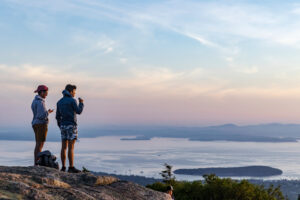BAR HARBOR, MAINE – The National Park Service looks forward to welcoming visitors to Acadia National Park this season! The Park Loop Road, including the Cadillac Summit Road, will open to motor vehicles on April 15. The Hulls Cove Visitor Center opens to visitors on May 6. Campgrounds and other park facilities will open on various dates throughout April and May. Learn more about operating hours and seasons at Acadia.
We expect the 2022 summer season to be BUSY, so make sure to plan ahead and recreate responsibly while you’re here. Prepare for your trip to Acadia National Park by following our list of the top ten tips.
1. Arrive with a plan … and a back-up plan.
Acadia welcomed more than 4 million visits in 2021, and 2022 will be another busy year. Start your trip planning at nps.gov/Acadia and consider places to go and things to do. If you’re visiting during peak season (June -October), expect crowds and pack your patience. There may be lines for buses and services and parking in popular park destinations is limited (lots typically fill before 9 am).
2. Purchase a park entrance pass.
Visitors over the age of 15 are required to have a park entrance pass. If you are parking, don’t forget to display your pass through your windshield. You can purchase your park entrance pass online at Recreation.gov (please print your pass if possible!) or at locations in and around the park. Your fees help us enhance the visitor experience and protect resources at Acadia National Park.

Photo by Ashley L. Conti, Friends of Acadia
3. Purchase a vehicle reservation for Cadillac Mountain.
Vehicle reservations are required for Cadillac Summit Road from May 25 through October 22. Purchase vehicle reservations on Recreation.gov BEFORE your visit (and remember to print or download your reservation). Reservations are not available to purchase in person. Vehicle reservations are not required for other locations in the park or for visitors who enter the area by foot, bicycle, or taxi.

Photo courtesy of visitor Jessica Pearce Rotondi. Used with permission.
4.Consider a car-free experience.
Leave your car at your place of lodging and ride the fare-free Island Explorer shuttle. From June 23 through October 10, the Island Explorer connects surrounding communities with trailheads, campgrounds, carriage road entrances and popular destinations in the park, except for the Cadillac Summit Road.
5. Stay the night (but make a reservation first).
Advance reservations are required for the park’s four campgrounds. Make your reservation on Recreation.gov—in-person reservations are not available. Backcountry camping, campfires and overnight parking are prohibited outside of designated campgrounds at Acadia.
6. Drive responsibly.
Remember that you’re sharing the road with motorcycles, bicyclists, pedestrians and sometimes wildlife. Unless otherwise posted, the speed limit for paved park motor roads across Acadia is 35 mph. Slow down, stay alert and always wear your seatbelt. Want to focus on the views? Consider taking the Island Explorer shuttle!

Photo courtesy of Chris Bennett. Used with permission.
7. Play it safe.
Have fun, but put your safety first when exploring Acadia. If you’re hiking, study the difficulty of each trail and consider your fitness level before selecting a trail. Carry a trail map with detailed topography and don’t rely on cell connectivity for trail navigation. If you’re swimming, note that swimming in natural areas poses risks. Lifeguards will not be on duty.

Photo by Ashley L. Conti/Friends of Acadia
8. Share the carriage roads.
Acadia’s carriage roads can get crowded in the summer! Whether you’re walking, biking or horseback riding, stay aware of your surroundings and exercise courtesy. Keep to the right and give other visitors a clear warning before passing on the left. Bicyclists must yield to all users; pedestrians must yield to horses.
9. Protect and leash your pet.
You’re welcome to explore Acadia with your dog, but they must always be restrained on a leash no longer than 6 feet. Pets are prohibited from several trails, Sand Beach and Echo Lake Beach for parts of the year, park buildings and ranger-led programs. Always collect and properly dispose of pet waste and never leave your pet unattended in a vehicle.

10. Download the NPS app.
Consider downloading the NPS App and visit the Acadia National Park page. If you select “Save this park for offline use,” you’ll be able to access information throughout the park. The app includes info on accessibility, things to do, places to get your passport stamp and more!
 Join
Join Donate
Donate Acadia National Park
Acadia National Park







